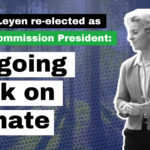The European General Court dismissed the People’s Climate Case on procedural grounds stating that the families and youth impacted by climate change do not have a right to go to court to challenge the EU’s 2030 climate target. However, in its decision, the Court recognised that climate change affects all Europeans in many different ways. Families and the Saami youth who initiated the case plan to appeal to the European Court of Justice.
In May 2018, 10 families from Portugal, Germany, France, Italy, Romania, Kenya, Fiji and the Swedish Saami Youth Association Sáminuorra sued the European Parliament and the Council of the European Union for the inadequacy of the EU’s climate target. The plaintiffs claimed that the target to reduce domestic greenhouse gas emissions by at least 40% by 2030, as compared to 1990 levels, is too low to prevent the climate crisis and thus fails to protect their fundamental rights of life, health, occupation and property.
As part of the proceedings both the European Parliament and the European Council, in October 2018, asked the Court to dismiss the case by arguing that the 10 families and the Saami youth are not to be allowed to go to court to challenge the EU’s climate policies since they are not sufficiently and directly affected by these policies (“direct and individual concern” criterion).
In its decision, the European General Court ruled on this technical point only but also acknowledged that “every individual is likely to be affected one way or another by climate change”. The case is dismissed due to a narrow interpretation of the “direct and individual concern” criterion. This decision of not allowing citizens to go to court, is disappointing but not surprising. This criterion is historically known to restrict access to courts for citizens.
The families, together with the Saami Youth Association from Sweden plan to appeal to the European Court of Justice before 15 July 2019. On appeal, the European Court of Justice will have to decide anew if the plaintiff families and the Sami youth are allowed to go to court to protect their rights.
Roda Verheyen, coordinating lawyer of the case said: “The case is not dismissed on the merits. On the contrary, the Court accepts that climate change is impacting everybody but refrains to engage with the facts of climate change and its human rights impacts. During the appeal procedure we will ask the European Court of Justice to look at the decision in the light of the facts of climate science and its human rights impacts we have shown in our application. This order cannot stand if the EU is serious about an “Europe for all“.
Maurice Feschet, 73 years old French farmer said: “At my age, besides joining climate marches with young people, this case is the only thing that I can do to protect my children and grandchildren. As a citizen, I will keep turning to the courts as politicians fail to deliver the needed climate action.”
Maike and Michael Recktenwald, hotel and restaurant owners from Germany said: “Regardless of how the legal process continues, we are convinced that this lawsuit has already made a difference. In all our countries where plaintiffs are involved, we have shown that the ongoing climate crisis is violating fundamental rights and that the EU must take action.”
Wendel Trio, Director of CAN Europe said: “The increase in climate cases and the success of youth mobilisations across Europe, are a clear call on European leaders to act fast and fundamentally address the climate crisis. We call upon decision-makers to listen to their citizens calling for more adequate climate policies and to agree on a substantial increase of the 2030 target. They need to protect Europeans from the consequences of climate change and ensure a safer future for younger generations ”
Since the People’s Climate Case is launched in May 2018, the European Parliament has adopted two resolutions calling for an increase of the EU’s 2030 climate target from 40% to 55%. Recently, 10 Member States, including France, the Netherlands, Denmark, Sweden, Spain, Portugal, Luxembourg, Latvia and Belgium, published a joint statement to call on all EU leaders to agree on achieving net zero emissions by 2050 and enhancing the 2030 target at the June European Council.
ENDS
MEDIA CONTACTS:
Goksen Sahin, CAN Europe Communication Coordinator, goksen@caneurope.org, +32 468 45 39 20
Climate Action Network (CAN) Europe is Europe’s leading NGO coalition fighting dangerous climate change. With over 160 member organisations from 35 European countries, representing over 1.700 NGOs and more than 40 million citizens, CAN Europe promotes sustainable climate, energy and development policies throughout Europe.
NOTES:
1) For more information about the appeal procedure, click here: https://peoplesclimatecase.caneurope.org/wp-content/uploads/2019/05/faq-appeal.pdf
Pleadings of the People’s Climate Case and the Court’s order can be found here: https://peoplesclimatecase.caneurope.org/documents/
2) Timeline of the People’s Climate Case:
24 May 2018: The People’s Climate Case is filed to the European General Court by 10 families and the Sami youth association
13 August 2018: the European General Court published the case in the Official Journal of the European Union and proceedings started officially.
24 September 2018: CAN Europe, Wemove.eu and the German Small Farmers Association (Arbeitsgemeinschaft bäuerlicher Landwirtschaft e.V.) applied to court to intervene in the People’s Climate Case.
15 October 2018: First written defence of the European Parliament and the Council are submitted to the Court.
10 December 2018: Plaintiffs answered the EU’s defence and the written procedure is closed.
15 May 2019: The European General Court shared its order on the inadmissibility of the case with the plaintiffs and the defence (the European Parliament and the Council)
3) Quotes from lawyers and plaintiffs:
Gerd Winter, lawyer for the case said: “ The UN have repeatedly acknowledged that protecting the climate is a necessity for human rights protection. Access to courts is a vital component to ensure human rights are upheld. We hope that this will be recognised by the European Court of Justice on appeal. ”
Sanna Vannar, 23 years old Sami reindeer herder representing the Sami Youth Association from Sweden said: “ Since we launched the case, impacts of climate change got worse and worse. For Sami youth, climate change is no longer about politics. It is affecting our daily lives: wildfires hitting the Saami grazelands, reindeer dying due to a lack of food, and emotional stress created by the uncertainty of climate conditions becoming my generation’s biggest health problem.
We need the courts to look into facts about climate change and remind the EU leaders their duty to protect citizens. This is not just a case. It is about protecting our rights and future. “
Alfredo Sendim, Portuguese farmer said: “We will not give up. We will continue seeking our right to be heard in the European General Court. And for the upcoming procedure, we hope to have a different European Parliament in defence. The next generation of EU lawmakers who will soon be elected in the European elections, must listen to their citizens and make climate change a priority for Europe.”
Giorgio Elter, Italian mountain farmer said: ” In our legal case, we are not asking for money or compensation. We want urgent and increased climate action. I will appeal and keep asking for concrete and ambitious measures to tackle the climate crisis. Because as a father, I am worried about the future of my daughters. We already feel the devastating consequences of climate change. This will become unbearable, if the politicians keep delaying concrete actions. “


